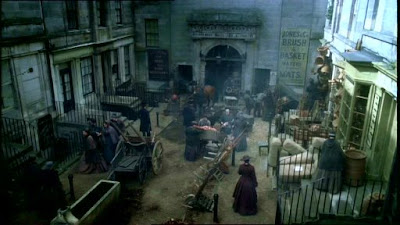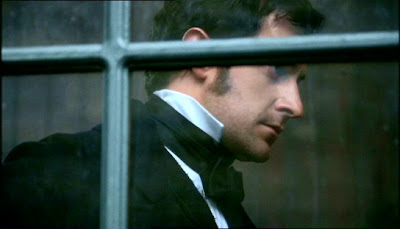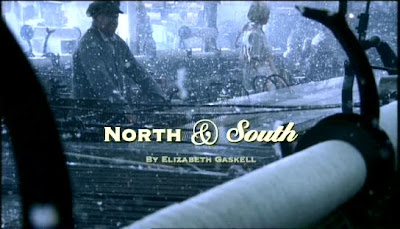Margaret Hale
It is about a young lady named Margaret Hale who moves with her family from the south of England to the smoky industrial city of Milton in the north. She finds herself caught up in the clash between workers striking and factory owners who struggle with market volatility and cheap imports. Margaret meets a cotton mill owner John Thornton who has wrenched his family out of debt by self-restraint and determination. On the other side of the conflict she meets Nicholas Higgins, a union man advocating better worker wages for all of Milton.
Riot at a mill
At the start Margaret has a somewhat naive and idealistic view of life. She hates the dirty smoky city of Milton. Its inhabitants seem in a constant state of labour and commercial gain at the expense of others. As a parson's daughter, she is part of the upper class, with all its disdain of those in the manufacturing or 'shoppy' industry. However, as she gets to know her new-found friends in Milton, she sees past the sharp and bleak exteriors and admires their strength of character.
Although Thornton and Higgins both grow and learn as the story progresses, it is Margaret who goes through the greatest personal transformation. She is well educated with cultivated manners and airs, but this has also made her proud and and quick to judge. She's had a sheltered life having a country clergyman for a father, and time spent with her fussy socialite aunts. Her youth and inexperience contribute to the huge culture shock when she moves to the north. It is her tenacity and sense of responsibility which facilitate the open-mindedness and compassion she develops living in Milton.
The main theme explored in the series is the breakdown of barriers. There are communication barriers between the Hales, class barriers between all main characters, plus social barriers between the mill owners and their workers. In each case the barriers have been built so high that the only two ways they are lowered are:
1. An independant outsider hears both sides of the story. Through their common friendship with the outsider, both sides are brought into closer contact and gain glimpses of what lies over the barrier. With a wider view, more dialogue and understanding, the walls dissolve.
2. A tragedy occurs which forces one side or both to relent from their position. When this happens it is shocking, abrupt, with mixed results and harsh side-effects.
Nicholas Higgins at a union meeting
Margaret's opinions of Milton and south are emphasised visually through colour and tone. Scenes in the bucolic south or opulent london houses are richly saturated with colour, brightly lit and have a soft focus. Like rose-tinted memories of better days. Scenes in the industrial north are shown in contrasting and sombre tones of black, grey and white. Those who enjoy watching period pieces for beautiful costumes and lavish ballroom scenes will not have much eye candy here.
Do not fret. There is something better: the interior of working cotton mills! This is a visual treat especially for those with an interest in mechanical tools. The workers toil at their wrought metal machinery which precisely guides the cotton threads. These images set this series apart from the usual costume drama with stately houses and manicured lawns. In one key scene, we watch the ethereal cotton float dreamily in the air. Suddenly a dark silhouette comes into focus. As it cuts across the mill we realise it is the menacing figure of the mill owner John Thornton. In North and South appearances are deceiving. The cotton appears soft and beautiful, yet it slowly clogs and chokes the workers lungs. Thornton appears cruel, bad tempered and violent as the master of the mill, yet he is a complex character that has inspired plenty of discussion.
Margaret's first view of a cotton mill
It is impossible to review North and South without elaborating upon the phenomenon that is Richard Armitage as John Thornton. This is a juggernaut of a performance. If there is ever another adaption of this novel, I pity the actor who has to fill Armitage's shoes. Hopefully it won't be for another 20 years, because it would take a generation gap for viewers to forget this actor's turn. The man was born to play Thornton. Tall, dark, deep set eyes, hawkish nose and strong jaw all give him an air of will power and rough masculinity. This guy could outbrood any Byronic hero even with a mustard coloured cravat.It is not simply the physical appearance of Richard Armitage which has elicited so much admiration of John Thornton, though it certainly doesn't hurt. During Victorian times, Margaret would have been considered out of Thornton's league, despite his wealth and position in Milton society. This is since he is from the manufacturing industry, and she is a lady belonging to a higher class. It makes him the underdog. His violent tendancies, steely business principles and sharp facial features make him appear somewhat dangerous.
Thornton's machinery is an extended analogy of the man himself. Forged and toughened metal which delicately weaves thread into quality fabric. He built up his cotton empire despite having started out with a terrible inheritance of debt and family shame. Upon reaching an admirable position in Milton society and business, he seeks to improve his general education through tutoring and open discussion with Mr Hale. This shows an inquisitive and clever mind open to new ideas.
In his relationship with his mother, Thornton also stands out. She is iron-willed and frightfully proud. She does not tolerate fools or any criticism of her son. Thornton appreciates her contribution to the man he has become. They are both honest and open with each other, having lived years of hardship interdependantly. He respects her, but ultimately always makes his own decisions and takes responsibility for his own actions. Especially if they affect his workers. What a son!
These are the major factors which endear the character to the viewer. We see him make decisions with far-reaching consequences, sometimes blunders, learning and eager to try different approaches. Watching him struggle, most people are on the edge of their seats hoping that he will not lose what he has toiled for.
When the series first screened end 2004, the viewers clogged up the BBC messageboard so heavily they crashed it. The BBC decided to shut it down but the series had already worked its magic. The fans were bewildered when informed there were no plans for a DVD release. Had it not been for the articulate and persistent campaigning of the 'Armitage Army', those without BBC on cable would have little chance to watch this rare example of tv enchantment. The excellent script, cast and still relevant themes have brought together like-minded individuals with a fondness for English literature and intelligent tv adaptions. Finally the DVD was released. Friendships have formed. Some have followed the cotton trail online and made fanvids and banners inspired by the series. Others have gone on to pursue careers as writers! It's pretty encouraging to discover what good storytelling can inspire.
I just think it's cool to watch a leading man from the manufacturing industry (for once!!) and see inside a cotton mill. Highly recommended.
Resource link










5 comments:
A must see for those who love classics and anything Austen! (One viewing is NOT enough!) Considering purchasing your own copy of the DVD to peruse at your leisure!
I totally agree- definately buy the DVD (with the extra bits) and if you don't have time to read the book, get it as an audiobook.
Your review was just wonderful. Richard Armitage's G of G on BBC really wowed me so I thought I should re-watch North & South as I wasn't that impressed two years earlier. What a difference a sadistic Black Knight can make on a girl!
The authentic mill interior with the white cotton floating through the air is stunning, especially with our dark haired hero striding through it like a Northern snow storm. Armitage is mesmerizing as John Thornton, with his lethal combination of piercing blue eyes, soft voice and explosive temperament. RA can convey more in a glance than most actors can in a fifteen minute exposition and his subtle use of his hands and mouth subtly convey inner emotions in this break-out role. The scenes between Armitage and Sinead Cusack are just amazing as they possess a familial resemble in coloring and the tenderness and pride between mother and son is palpable and deeply affecting. N&S relies on the same general plot as Pride & Prejudice so in the second half of story-Margaret spurns Thornton's marriage proposal but then is compelled by his moral character/actions to reconsider. Thornton always acts honorably but has a quick temper and an inferiority complex. When he is brought low by circumstances beyond his control, he reacts by becoming more humane and compassionate which works to his advantage on many levels. This is a keeper, just go ahead and buy it and place it on the shelf next to Pride and Prejudice so you can watch it at any time.
Thanks Anonymous#3, Your comment is just wonderful! I'm glad you decided to revisit it after RH. GoG is pretty cool but Mr Thornton was my first RA dose. Everything about N&S worked in his favour.
Ragtag, great "sane" review! I had no idea that the BBC hadn't originally intended to release it on DVD. You would think with the website crashing that would have given them a clue!
Well, great review! Love your thoughts. And like you, N&S was my first intro to RA and he won me over right away, from that very first scene where he is running down the stairs in the mill; he is a total dreamboat *swoon* I totally agree with you statement that
"It is impossible to review North and South without elaborating upon the phenomenon that is Richard Armitage as John Thornton. This is a juggernaut of a performance. If there is ever another adaption of this novel, I pity the actor who has to fill Armitage's shoes. Hopefully it won't be for another 20 years, because it would take a generation gap for viewers to forget this actor's turn. The man was born to play Thornton."
You hit the nail on the head! I couldn't even formulate such a coherent thought when I saw the film for the first time over the summer. Thank you for putting it so eloquently :)
Post a Comment